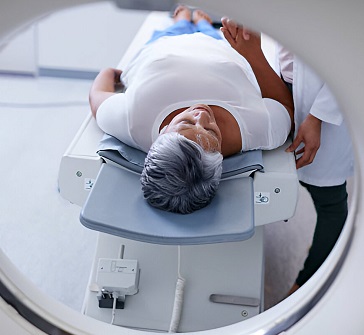 Book Appt.
Book Appt.
 Call Now
Call Now


Anal cancer (also known as anal canal carcinoma) occurs in the tissues or lining of your anus. Your anal canal joins your anus (the opening) and rectum (the lowest part of your digestive system). Your anus is where excrement exits your body. Healthcare practitioners can cure anal cancer if it is detected and treated early. There are two forms of anal cancer: squamous cell carcinoma and adenocarcinoma. The most frequent type of anal cancer is squamous cell carcinoma. Squamous cell carcinoma in anal cancer differs from skin cancer, which begins in the top layer of the skin.
Symptoms
Anal cancer symptoms may appear to be ordinary conditions, such as a persistent itch in the anus. Additional symptoms may include:
Causes
The specific cause of anal cancer remains unknown. However, there are some risks linked with the condition. For example, the majority of anal cancer incidences are connected to specific kinds of human papillomavirus (HPV). However, it is crucial to emphasize that the vast majority of HPV-positive individuals do not develop anal cancer.
Diagnosis
Your provider will do a digital rectal exam. They will do an anal Pap test or a biopsy to collect cells for a medical pathologist to analyze under a microscope. (Women and people with AFAB may undergo pelvic examinations.) Your provider will also do endoscopic and imaging examinations.
Endoscopic tests
Endoscopic tests are performed by providers to examine the insides of your rectum and anus. These tests are performed utilizing specialized equipment, which are thin, flexible tubes equipped with a light, a lens, and a video camera. They may collect tissue samples (biopsies) for pathologists to evaluate. Endoscopic testing involves:
Imaging tests
Imaging examinations allow clinicians to learn more about tumors, such as their size and particular location. Imaging tests can include:
Anal cancer staging
Cancer staging systems are used by healthcare providers to plan treatment and create prognoses, which are expectations for what will happen following treatment. They examine tumor size, the presence of cancer in your lymph nodes, and if the tumor has spread or metastasized. Anal cancer has five stages: stage 0, stage 1, stage 2, stage 3, and stage 4.
Treatment
Treatment for anal cancer varies depending on the type and stage of the disease, but may include:
Radiation therapy: Anal cancer is treated with external beam radiation therapy (EBRT). EBRT is classified into several types, including intensity-modulated radiation therapy (IMRT), stereotactic body radiation therapy (SBRT), three-dimensional conformal radiation therapy, and brachytherapy.
Chemotherapy: Chemotherapy and radiation therapy are frequently used as early treatments for anal cancer. The combination treatments frequently eradicate anal cancer, eliminating the need for surgery. If you require surgery, you may receive chemotherapy before surgery to decrease the tumor (neoadjuvant chemotherapy) or after surgery to eliminate any leftover cancer cells (adjuvant chemotherapy).
Surgery: Laparoscopic abdominoperineal resection is a minimally invasive procedure used to treat anal cancer that has recurred or did not respond to radiation therapy and/or chemotherapy. It entails removing the anus, rectum, and colon. If you have this surgery, your surgeon will also perform a permanent colostomy, which allows you to expel excrement into a bag or pouch linked to your body.
Immunotherapy: If you have late-stage anal cancer, your doctor may suggest immunotherapy to alleviate your symptoms. Immunotherapy helps your body fight cancer.
Prevention
There is no guaranteed way to prevent anal cancer, but you can reduce the risk by taking the following steps:
Conclusion
Anal cancer is a rare but serious condition that requires prompt diagnosis and treatment. While HPV infection is a major risk factor, it is important to remember that anal cancer is preventable with vaccination against high-risk strains of HPV and regular screening for those at high risk. If you experience any unusual symptoms like rectal bleeding, pain, or a lump near the anus, it is important to consult a healthcare provider for a thorough evaluation. Early detection and treatment can significantly improve outcomes and help those affected lead healthier lives. Visit SHALBY Sanar International Hospitals to learn more.
SHALBY Sanar International Hospitals provides extensive medical procedures backed up with our state-of-the-art technology and a team of highly qualified & experienced clinical experts.

Grade 2 Endometrium Cancer | Ms. Robiyakhon | Uzbekistan | Dr. Archit Pandit | SHALBY Sanar

Male Breast Cancer Recovery Story | Dr. Archit Pandit | Cameroon | SHALBY Sanar

Ms. Nafisa’s Inspiring Breast Cancer Recovery | Dr. Archit Pandit | Uzbekistan | SHALBY Sanar International Hospitals

Stage4 colon cancer is curable - Colon cancer with liver metastasis | Kenya | Dr Archit Pandit

Patient from Kenya Treated by Dr. Archit Pandit | SHALBY Sanar International Hospitals

Double Cancer Victory: Mrs. Salma Kapoor's Inspiring Recovery Story | Dr. Archit Pandit

Patient from Uzbekistan Treated by Dr. Archit Pandit | SHALBY Sanar International Hospitals

Patient from Uzbekistan Treated by Dr. Archit Pandit | SHALBY Sanar International Hospitals

Successful Carcinoma Buccal Mucosa Surgery of a Patient from Nigeria by Dr. Archit Pandit

Successful Colon Cancer Surgery of Mr. Faraidun Kaka Bra Amin Amin's from Iraq | Dr Archit Pandit

Miraculous Recovery of a patient from Uzbekistan battling Ovarian Cancer | Dr. Archit Pandit

Successful Cancer Detection & Surgery by Dr. Archit Pandit | SHALBY SHALBY Sanar International Hospitals

Successful Colon Cancer Treatment of a patient from Iraq by Dr Archit Pandit | Surgical Oncology

Successful Glottis Mass & Carcinoma Vocal Cord Treatment of a patient from Iraq by Dr Archit Pandit

Successful Stage 4 Colon Cancer Treatment of a patient from Kenya by Dr Archit Pandit

Surviving the Odds: 56-Year-Old's Journey with Recurrent Carcinoma Vocal Cord | Dr. Archit Pandit

Surviving Recto-Sigmoid Cancer: Mr. Syamand Ahmed's Inspiring Journey

Success Story: Iraqi Patient's Liver Tumour Treatment at SHALBY Sanar International Hospitals

Cytoreductive Surgery Success: Iraqi Patient's 30cm Ovarian Tumor Removed Safely

Beating Liver Cancer: Mr. Abdirashid's Inspiring Story

Ms. Nejood's Success Over Pancreatic Cancer: A Remarkable Journey

Transforming Smiles: Revolutionary Buccal Commando Procedure

Wide Local Excision Surgery & Microvascular Reconstruction of a Cancer patient

Successful Surgery of Esophgeal Cancer

Successful Lung Cancer Surgery of Ms. Jerioth Wanjiru from Kenya

Para Thyroidectomy on Pt Jawad Kadhim Tweli from Iraq

Dr Archit Pandit discusses the fascinating case of Geeta Rani
Our doctors pen down their research findings and experiences from time to time. Their words provide deep insight into the latest techniques, technologies and other advancements in healthcare. It provides expert answers to all kinds of health questions for real-life issues.
VIEW ALL




Since the day of its foundation, SHALBY Sanar International Hospitals is committed to provide comprehensive healthcare services. It regularly organizes awareness programs in its premises and encourages outdoor healthcare activities and camps with an intent to put focus on preventive healthcare.
VIEW ALL